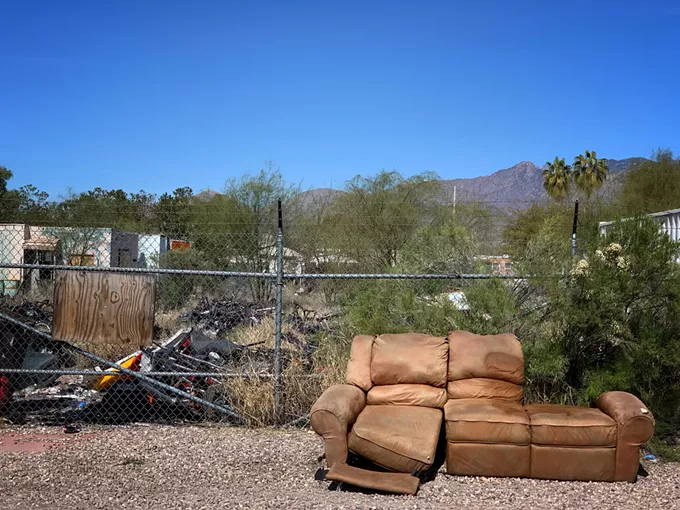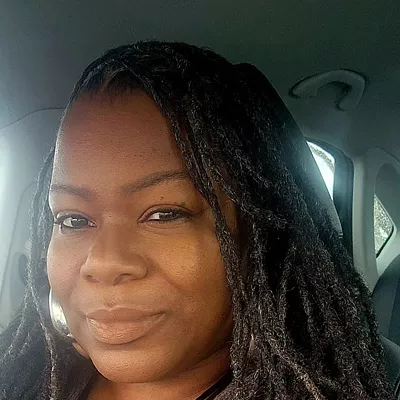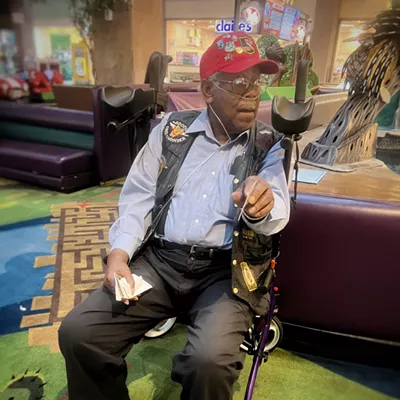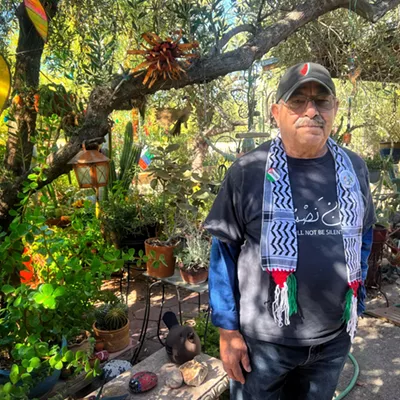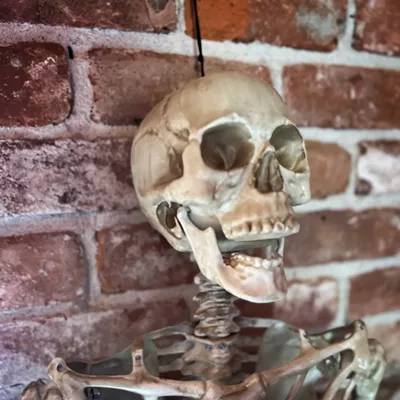It was like the dog possessed something inside of him that keeps him going. The little guy is on the weedy side, wretched in the heat and fleas, the associated hassles. A ridiculous notion comes to mind about a dog considering suicide.
Never mind the useless jokes.
The staid quality of the afternoon light offers burns for an even deeper despair. Man, it can get ugly on a Tucson summer day in the city. The shadeless streets and commerce, the refuse clinging to chainlink and blistering gravel, the broken heat records.
The black dog belongs to this guy Randy, “just “Randy,” no surname. And “no pictures, I don’t want no pictures of me out there. It’s dangerous, man.”
I meet Randy on the side of a Swan Road Circle K. He and his dog have nowhere to go. Randy has had nowhere to go for three years since “before Colorado.”
I ask if I can get him something to drink or eat. I go into the store and return with a Solar Pop full of Mountain Dew and ice, a bag of Doritos, and a small water for the dog. Randy accepts the goods, takes the water and pours it into a bowl for his dog, who steps over and laps at it until it is about gone.
Randy’s skin is sun-detailed into a rich coffee color. He is shirtless and painful-looking red hues streak his shoulders. I can’t help but notice how his hair grows down the back of his neck onto his upper back, slightly longer than the graying crew cut on his head, and forms a kind of peninsula there.
He wears camo knee-length shorts, tired logger boots and is sinuous — more outdoor survivalist than starvation. A camping backpack — “tactical,” he calls it — leans against the K where he stands. He’s mid-40s, maybe.
The nose-scarred black dog, a lab-pitbull mix of sorts, is christened Cash, after Johnny, “because he wears black all the time.” Randy found Cash on a Tucson street, “a stray, and he just followed me, so I took him in.”
Cash circles his owner like a depression, dragging his ugly leash, stops and sniffs Randy’s hand, until he finds a Dorito chip. He snarfs it, licks the fingers, looks up to both of us, takes note of the conversation and settles on his stomach, mouth agape, tongue out and paws outstretched on the concrete.
Randy tells me he once had his own crew, house painters, in Minnesota, which was good, and then there was jail, to which he just shakes his head and says “I’d rather not say anything about the whys and hows of prison.” His mom died when he was a kid, Dad had long vanished. He has no children. Now he sleeps in the desert, walking distance from Brandi Fenton park, uses the kid’s splash pad there to wash off and cool down when no one is around, easy to accomplish on merciless summer days, especially now that school is in session.
There is a darkness about this guy, the kind that seeps in while in prison and later lays low like an eternal appetite. And there is nothing he could say in this long moment that would sound like an exaggeration, more like a pragmatic tally of daily rituals: come to, hide his tiny camp, create a sign for street coin, feed Cash water and food. He’ll usually have enough to cap the day for a bottle. No drugs, just drink, “the curse of my father.”
His hand-scrawled cardboard sign, perched atop his backpack, reads, “The United States just keeps killing my spirit. Anything helps.”
“That’s a pretty succinct and honest sign to fly on the street,” I say.
“Yeah, I guess,” he says. “I try to think of things that might matter to someone.” He adds, “if this country goes down, and it’s gonna, I haven’t got shit to lose because I ain’t rich.
“I learned out here (on the street) the less you have, the less anyone can steal. Anyway, I would never vote. I couldn’t even if I wanted to.”
Cash rises, lets out a hungry exhale, slowly steps over to the sidewalk Amazon locker, looks back at Randy, and pisses on the bottom of the gleaming metal compartments.
“I don’t know anyone who’s not basically living on the streets,” Randy continues. “They’re disabled, busted in the head, or lost and fucked up on G or Fent, and off the bus from prison.”
He adds in that same grin-less monotone as if he’s talking of the bus schedule, “Makes you think of Jesus, right?”
I laugh. I want to hear more, selfishly. Like has anyone held Randy so tight as to feel his heartbeat? But he is tight-lipped, cagy, brutish even, only says what he wants, is in another mind weighed down by severe burdens of existence. Whatever permutations through the years led Randy and Cash together here, it all seems too easy. So, no, he doesn’t want to share much more.
“Thanks for the food and drink,” he says, in an almost businesslike way. He moves and huffs up his heavy backpack, his sign and balances the Solar Pop with the water bowl. Cash dutifully follows him, that leash dragging across the pavement. The pair steps from the sidewalk and into the realm of the unseen, like ghosts in that ugly sharp sun.
I step to the car, hop in, drive off. I have a daughter getting out of pre-school soon. While waiting for her, I keep thinking of poor Cash outside Circle K. The little black dog, a mirror of a life. And with each step Cash takes my heart breaks.
I remember our family dog, Samantha, a pound rescue, a lovely sensitive beagle and dachshund mutt, and I about well up in tears. That dog was a hell of a cohort and ally, an antidepressant. And what of Cash in the desert and in the town? Not even a bark.

